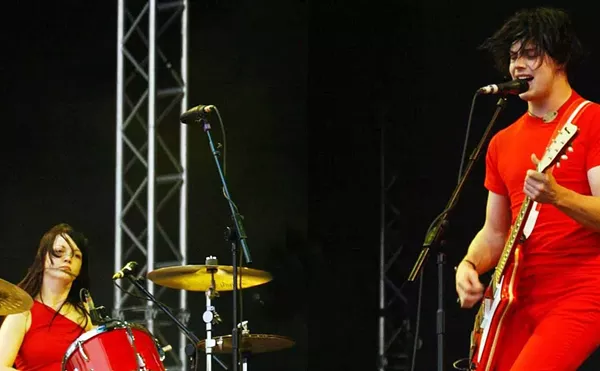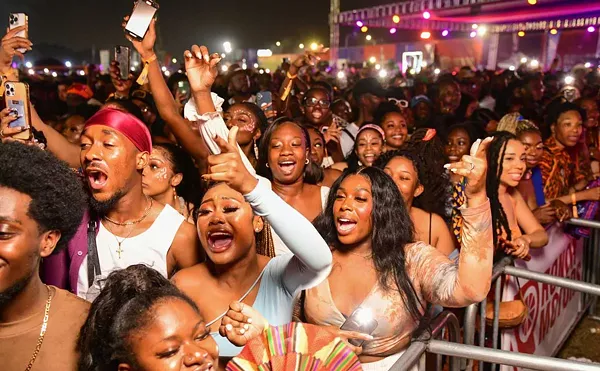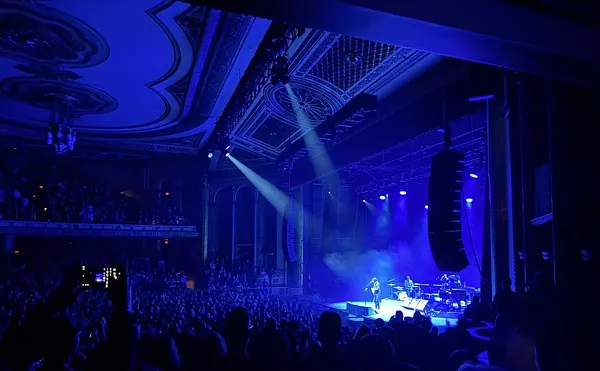
Audio By Carbonatix
[
{
"name": "GPT - Leaderboard - Inline - Content",
"component": "35519556",
"insertPoint": "5th",
"startingPoint": "3",
"requiredCountToDisplay": "3",
"maxInsertions": 100,
"adList": [
{
"adPreset": "LeaderboardInline"
}
]
}
]
Old school is synonymous with retirement home when it comes to rap. While pop old-timers like Phil Collins are still charting years after they’ve flat-lined or entered a persistent vegetative state, classic rappers like Eric B., KRS-One and Prince Paul might as well have died from mainstream hip-hop’s perspective. They’re too busy trolling the rap sheets and mug shots for new artists (or hooking up the latest protégé of this week’s hottest producer). It all gets so boring, really. What suffers, ultimately, is the music.
But “classic” rap artists don’t just fade away, they remain, just beyond the camera frame, perhaps, like this guy Prince Paul.
The famed DJ and producer is touring in support of his project, Handsome Boy Modeling School, with fellow producer Dan The Automator.
White People — the follow-up to 1999’s So...How’s Your Girl? — continues the duo’s laundry list of styles, singers and irreverent humor, all melded with skit humor (and not surprising given Handsome Boy Modeling School’s concept was derived from a skit on Chris Elliot’s short-lived TV show, Get A Life). If the conceit wears a bit thin this time around, at least Paul and sidekick Dan the Automator prop it up with bright, colorful production.
We caught up with Paul at his mom’s (yes, his mom’s) Amityville, Long Island, home. Paul is certainly gregarious and he enjoys ranting, particularly when it’s against the selling out of hip hop and rap. In fact, everything that shoots from his maw is a journalist’s wet-dream of a quote.
“It’s not very handsome, but I feel handsome,” Paul says, between bites of chicken wings and fries. “They’re having a new Amityville Horror movie, so I’m staying close because I know the press is gonna be here any minute.”
For those who missed the plot, Paul first hit the scene as a DJ in the seminal ’80s rap outfit Stetasonic (perhaps the first hip-hop act to employ a live drummer), and gained further acclaim as a producer: He did Fine Young Cannibals and the groundbreaking De La Soul debut, 3 Feet High and Rising.
Now deeply ensconced in the underground, he’s often dismissed as “backpack music,” a phrase humorously employed by Dave Chappelle in one of the comical skits off Paul’s last solo album, 2003’s Politics of the Business. (Paul also helped pioneer the inclusion of skits on records with that De La Soul release.)
“I think I’m indirectly responsible for that [backpack music]. I tried to trace it back. I don’t remember that whole backpack thing starting until De La Soul, so, maybe I’m to blame for some weird reason,” Paul says, before launching into a definition of what backpack really means. “Did he sell less than a certain amount of copies? Then he’s backpack. His audience is just a few kids that go into Phat Pete’s [record store], that go, ‘Yo, let me get that Yosemite Sam I Am record, or whoever the new hip-hop guy is.’ If you’re in Best Buy, you sell several hundred thousand, then it’s different.”
Indeed, “backpack music” is also a backhanded slap aimed at the predominantly white audience of most underground rappers. (Ironic since it’s questionable whether rap would have grown to a $3 billion-a-year industry without the early ’90s racial crossover of bands such as A Tribe Called Quest and De La Soul.)
“Back in the days, I don’t know if you’d consider them fans, but people would come party, and I just happened to be there at the time DJing. It was black kids and Latin kids, partying. Slowly but surely it started to change, and now if you see a black person at anything I do it’s like, ‘Wow, he really stands out.’ I want to ask him, ‘What are you doing? Ja Rule isn’t here today,’” Paul says, laughing.
Listening to Paul speak about hip hop’s limp progression, he could be a disappointed parent. He’s rightfully miffed that most kids aren’t doing their damn homework.
“What’s weird is authenticity, especially when it comes to hip hop,” he says. “I always get confronted, like, ‘That’s not real hip hop.’ I ask their age and they go ‘I’m 20.’ You know, you’re not really at the point to judge what’s real. I guess when Afrika Bambaataa wore that space outfit for Planet Rock, that wasn’t real, was it? People really don’t have a sense of the history. It’s like, ‘I shot somebody, I went to jail, that’s what hip hop was made of in the ’70s — a whole lot of inmates came out and celebrated in the streets.’”
If you think about it, humor used to play an important role in hip hop and rap. Hell, Straight Outta Compton was so over-the-top it’s practically a comedy album. That sense of irony is lost on much of the current generation of rappers.
Paul agrees. “It has nothing to do with humor anymore, it has to do with being gangsta, being shot. And now we see the humor in that because it’s a little absurd. How angry can you be, you’re driving a Bentley. You must’ve been really angry when you were driving that Pinto or Hyundai Excel.”
Paul isn’t that much more impressed with the do-as-I-do aspect of the underground, either. “Usually the underground was a little experimental as well; now you have to have a sound to be underground. You have to copy Pete Rock or DJ Premier. Once you copy that sound you’re authentically underground. A lot of those beats sound really good, but they’re definitely not groundbreaking.”
Is it all part of a general decline in the overall quality of production, or does it have to do with simply wanting to be famous?
“People just run the beat and let it go, and let the emcee do all the changes,” Paul says. “It’s up to the emcee to make all the changes for the chorus. People don’t sit down and have a little rapport going and hang out and have fun, and then you go make the record when you’ve done that and it has a vibe to it. Now it’s, ‘Send me the track. You don’t have to be there. My man here is going to record me at the studio, and I’ll just send it back to you.’ The camaraderie of getting together and making a record has totally been lost.
“The sad part of it is,” Paul says, “a cat like that will sell a million records, and how are you going to argue with that? Prince Paul does a million arrangements and sells two copies and the guy who went ‘Boom! Smack!’ sells a million. His argument’s valid — ‘Hey, Paul, look — I got Top 10.’”
OK. So, then, what’s Paul’s take on the progression of hip hop?
“My whole thing is take any record from ’99 to 2005 and interchange it,” he says, his voice rising in volume. “You don’t hear any difference in time. But if you take a record from ’95 to ’99, you’ll hear a difference, even ’90 to ’95 or going back in five-year increments. You could interchange any Jay-Z album with any of his other albums. I love Jay-Z; I think he’s incredible, but it’s like as far as musically advancing, as far as production and stuff, nothing’s changed. That’s why when Kanye West comes out, he’s so refreshing.”
You shouldn’t get the impression that Paul’s bitter. He swears he’s given that up. “It’s like what can you do about it? It’d be nice to get some credit. Hell, it’d be nice to get paid. But it’s to the point, what could you possibly do? Who would possibly really care aside from you? It’s a lot of wasted energy.”
He pauses for a breath. Then he adds, “That’s why I chose to be handsome now, because handsomeness lives forever.”
How’s that?
“It’s easy. Look at George Hamilton, look at his hand. How handsome is that? Why, he’s been orange as long as I can remember. It’s all that Love at First Bite money that’s helped him retain his looks,” Paul says, wryly. “I’ve gotten older, and I’ve just stopped caring. You get to a certain age, and you’ve made enough money to keep the lights on, you’re just like, ‘Fuck it, you either love me or hate me.’”
Monday, April 11, at the Blind Pig (208 S. First, Ann Arbor; 734-996-8555) with K-OS and Rondo Brothers. Chris Parker is a freelance writer. Send comments to letters@metrotimes.com





